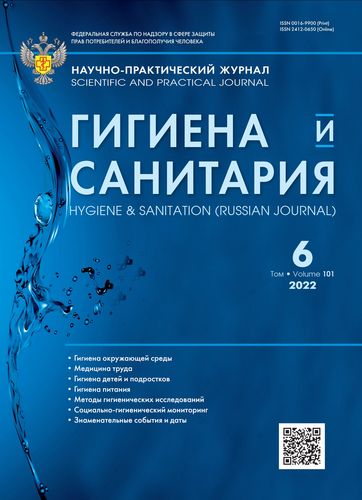Immunological markers of the development of bronchial asthma under conditions of contamination by bio-mediated technogenic chemical factors in children
- Авторлар: Alikina I.N.1, Dolgikh O.V.1
-
Мекемелер:
- Federal Scientific Center for Medical and Preventive Health Risk Management Technologies, Federal Service for Surveillance on Customers Rights Protection and Human Wellbeing
- Шығарылым: Том 101, № 6 (2022)
- Беттер: 670-674
- Бөлім: HYGIENE OF CHILDREN AND ADOLESCENTS
- ##submission.datePublished##: 30.06.2022
- URL: https://vestnik.nvsu.ru/0016-9900/article/view/639152
- DOI: https://doi.org/10.47470/0016-9900-2022-101-6-670-674
- ID: 639152
Дәйексөз келтіру
Толық мәтін
Аннотация
Introduction. The issue of sanitary safety of the population under the conditions of chronic exposure to environmental anthropogenic chemical factors, which play an etiological and pathogenetic role in the formation of non-communicable diseases, especially in the occurrence of bronchial asthma (BA) in children, is currently becoming particularly relevant.
Materials and methods. Sixty six institutions located near major highways were examined. Of these, the observation group consisted of 21 children whose content of manganese, chromium and formaldehyde in biological media significantly exceeded background values (p < 0.05). The comparison group consisted of 45 children with the content of haptens in biological media at the level of background indicators. The analysis of biological media for the content of chemical allergens by mass spectrometry, formaldehyde was made with high-performance liquid chromatography (HPLC). The study of the immune status of the examined cases included the use of flow cytometry (CD3, CD4, CD25, CD95), enzyme immunoassay (leukotrienes, IL1ß, IL4, IL6, IL8, IL10, INFu, TNFa, IgE total), the Mancini method (radial immunodiffusion) (IgM, IgG, IgA) and allergosorbent testing (specific to allergen metals and formaldehyde IgE).
Results. A comparative analysis of the immune and allergological status of the subjects revealed children with atopic bronchial asthma, characterized by excessive contamination with bio-mediated haptens, to show a significant increase in total and formaldehyde- and chromium-specific IgE, leukotrienes, as well as lymphocytes expressing CD25 and CD95 molecules (p < 0.05) and a decrease in cytokine expression.
Limitations. There were no restrictions on the conduct of research related to reagents and instrumentation.
Conclusion. As a result of the performed studies, there were substantiated immunological markers of the effect, reflecting the modification of the immunological response of children with asthma in conditions of elevated contamination of the biological media with chromium, manganese and formaldehyde, which have an adjuvant effect on the body, forming the features of immunological manifestations of asthma (for example, the city of Perm).
Compliance with ethical standards. The study was conducted in accordance with the norms of the Helsinki Declaration of the World Medical Association “Ethical principles of medical research involving people as subjects” and the National Standard of the Russian Federation GOST-R 52379-2005 “Good Clinical Practice” (ICH E6 GCP).
Contribution:
Alikina I.N. — the collection and processing of the material, writing a text, editing;
Dolgikh O.V. — the concept and design of the study, writing a text, editing.
All authors are responsible for the integrity of all parts of the manuscript and approval of the manuscript final version.
Conflict of interest. The authors declare no conflict of interest.
Acknowledgement. The study had no sponsorship.
Received: April 25, 2022 / Accepted: June 8, 2022/ Published: June 26, 2022
Авторлар туралы
Inga Alikina
Federal Scientific Center for Medical and Preventive Health Risk Management Technologies, Federal Service for Surveillance on Customers Rights Protection and Human Wellbeing
Хат алмасуға жауапты Автор.
Email: alikina.in@mail.ru
ORCID iD: 0000-0002-2057-9828
Junior researcher of the department of immunobiological diagnostic methods, Federal Scientific Center for Medical and Preventive Health Risk Management Technologies, Perm, 614045, Russian Federation.
e-mail: alikina.in@mail.ru
РесейOleg Dolgikh
Federal Scientific Center for Medical and Preventive Health Risk Management Technologies, Federal Service for Surveillance on Customers Rights Protection and Human Wellbeing
Email: noemail@neicon.ru
ORCID iD: 0000-0003-4860-3145
Ресей
Әдебиет тізімі
- Izmerov N.F., Denisov E.I., eds. Occupational Health Risk for Workers (Guidelines) [Professional’nyy risk dlya zdorov’ya rabotnikov (Rukovodstvo)]. Moscow: Trovant; 2003. (in Russian)
- Lutsenko M.T. Ethiopatogenesis mechanisms of bronchial asthma. Byulleten’ fiziologii i patologii dykhaniya. 2004; (19): 7–11. (in Russian)
- Male D.K., Brostoff J., Roth D., Roitt I. Immunology. Philadelphia: Mosby Elsevier; 2006.
- Popov N.N., Kurinnaya E.G. Molecular and cellular mechanism of i type allergic reaction development. Basis principles of diagnostics and therapy. Vestnik Khar’kovskogo natsional’nogo universiteta imeni V.N. Karazina. Seriya Meditsina. 2002; (3): 115–26. (in Russian)
- Tazhimetov B.M., Dyusembaeva A.T., Abilova A.A., Isabekova U.A., Mukanova S.M., Pernebekova S.P. Universal role of mediators in the development of asthma. Vestnik Kazakhskogo natsional’nogo meditsinskogo universiteta. 2014; (4): 35–6. (in Russian)
- Navruzova Sh.I., Rakhmonova Sh.K., Suleymanov S.F., Rasulova O.T. Cytokine levels in children with bronchial asthma. Vyatskiy meditsinskiy vestnik. 2015; (2): 87–8. (in Russian)
- Lambrecht B.N., Hammad H., Fahy J.V. The cytokines of asthma. Immunity. 2019; 50(4): 975–91. https://doi.org/10.1016/j.immuni.2019.03.018
- Bai Y., Zhou Q., Fang Q., Song L., Chen K. Inflammatory cytokines and 2-Lymphocyte subsets in serum and sputum in patients with bronchial asthma and chronic obstructive pulmonary disease. Med. Sci. Monit. 2019; 25: 2206–10. https://doi.org/10.12659/MSM.913703
- Dolgikh O.V., Kevorkov N.N. Diagnostics of the specific sensibilization to low-molecular compounds: formaldehyde as an example. Russian Journal of Immunology. 2002; 7(3): 268–70.
- Balmasova I.P., Sepiashvili R.I., Sepiashvili Ya.R., Malova E.S. Bronchial asthma pathogenesis and genetic prognosis development. Zhurnal mikrobiologii, epidemiologii i immunobiologii. 2014; 91(3): 60–6. (in Russian)
- Gracheva L.A. Cytokines in Oncohematology [Tsitokiny v onkogematologii]. Moscow; 1996. (in Russian)
- National program «Bronchial asthma in children. Treatment strategy and prevention» [Natsional’naya programma «Bronkhial’naya astma u detey. Strategiya lecheniya i profilaktika»]. Moscow: Atmosfera; 2008. (in Russian)
- Abadzhidi M.A., Lukushkina E.F., Mayanskaya I.V., Tolkacheva N.I., Ashkinazi V.I. Cytokines’ level in oral cavity secretions of asthmatic children. Tsitokiny i vospalenie. 2002; 1(3): 27–35. (in Russian)
- Ofitserov V.I. Subclasses of Immunoglobulin G: Possibilities of Use in Diagnostic Practice [Podklassy immunoglobulina G: vozmozhnosti ispol’zovaniya v diagnosticheskoy praktike]. Kol’tsovo: VektorBest; 2005. (in Russian)
- Aleksandrova Yu.N. About the cytokine system. Pediatriya. 2007; (3): 124–8. (in Russian)
Қосымша файлдар







